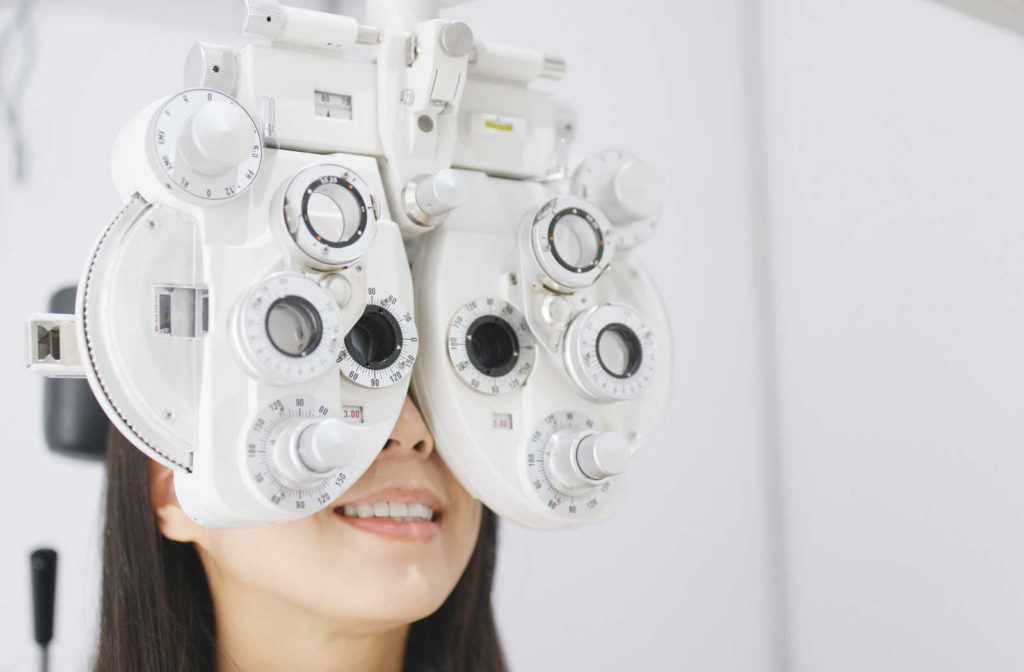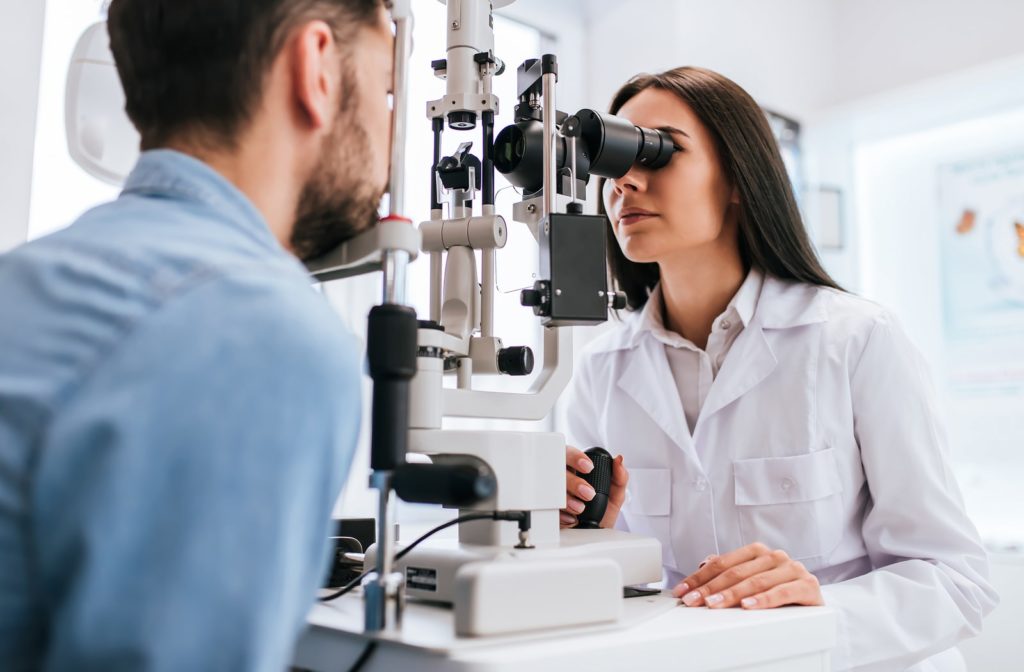Regular eye exams for the whole family are a part of taking care of our eyes. But in a world where we are always on the go, it can be hard to make time for things—even when we know they are important.
Different Types of Eye Exams
At 20/20 Vision Center, we offer four different exams to keep your eyes healthy and catch any potential problems such as an undiagnosed eye disease before it can cause irreversible damage.
Children
Care for our eyes doesn’t start when we can do it ourselves. As parents, it’s our duty to protect our children’s eyesight from birth.
In our experience, bringing your child in for their first exam when they are 1 is a great starting place. Once one of our experienced optometrists has examined your child’s eyes, we will recommend how often they should return.
According to the American Optometric Association (AOA), if there are no risk factors, one more visit before 5 and another before the first grade is acceptable. After that, an annual exam is sufficient unless otherwise recommended by the optometrist.
Adult & Senior
If your optometrist doesn’t think you’re at a higher risk for complications or eye disease, from 18 to 64, the AOA recommends a comprehensive eye exam every two years.
In between your annual exams, nothing says you can’t book an extra eye exam if there is a noticeable decline in your vision. Your optometrist may recommend comprehensive eye exams more often if something changes in your eye health over the years.
Diabetic
There is an inherent risk to our eyesight that comes along with diabetes. Because of that, there are several good reasons to book an annual comprehensive diabetic eye exam.
- Glaucoma: People with diabetes are at higher risk of suffering from glaucoma. The problem with glaucoma is that it often causes an unnoticeable change. Without regular eye exams, the damage could be irreparable.
- Cataracts: Most times, aging and injury cause cataracts. However, diabetes is another factor that puts you at an increased risk of getting cataracts.
- Diabetic retinopathy: The unnerving thing about diabetic retinopathy is that there are often no noticeable symptoms. Yet, it eventually leads to blindness. Control of blood sugar levels is a key to preventing this disease, and regular exams are crucial for early detection.
- Diabetic macular edema: High blood sugar levels put people with diabetes at risk for this condition. And if left undetected and untreated, this complication can lead to vision problems or blindness.
A significant thing worth noting about comprehensive eye exams is that they can play a pivotal role in the early detection of diabetes and its ongoing treatment.
Contact Lens Exam and Fitting
You may be surprised to learn that the same exam you receive to get your glasses prescription is not the same exam for contact lenses. To get the correct fitment for your eyes, the optometrist takes several things into account: pupil size, iris diameter, degree of cornea curves, and stability of your tear film.
Once one of our optometrists examines your eyes and determines the best lens for them, they’ll recommend the type and brand they believe is best for your eyes. You’ll be given a set of trial lenses to ensure proper fit and feel before ordering or purchasing a full supply.

What to Expect From an Eye Exam
At 20/20 Vision Center, you can expect an eye exam to take around 30 minutes.
If you have bigger issues upon your examination, you might want to be tested for any other risk factors. For someone with healthy eyes, not every test is necessary. However, if you or your child has certain risk factors, more comprehensive testing may be required. But what are these risk factors?
Child Risk Factors
- Premature birth or low birth weight
- Family history of eye disease
- Maternal smoking, drinking, or drug use during pregnancy
- Maternal infection during pregnancy
- Difficult labor indicating fetal distress
- Academic problems related to vision
- Neurodevelopmental problems—known or suspected
- Previous eye surgery or injury
- Prescription or over-the-counter medication with potential vision side effects
Adult Risk Factors
- Personal, family, or genetic history of eye disease
- Health conditions carrying potential eye issues
- Occupations demanding high visual performance
- Occupations that are potentially hazardous to the eyes
- Vision in only one eye
- Wearing contact lenses
- Previous eye surgery or injury
- Any eye-related conditions or concerns
Pitfalls of Vision Screening vs. Comprehensive Eye Exam
A comprehensive eye exam will consider more eye health factors than simply how far and clearly you can see. Vision screening certainly has its place, but several things contribute to a comprehensive eye being better in many cases.
- Personnel: A vision screening is not always performed by an optometrist. It takes a certain amount of training and experience to accurately and confidently assess results from a vision screening.
- Equipment: Even if a vision screening takes place in a doctor’s office, that doesn’t mean the correct equipment, lighting, distances, etc., are being used.
- Testing: In most cases, a vision screening only measures the distance from which you can see clearly. It doesn’t account for other factors such as focusing and close-up vision. And it can miss other undiagnosed problems such as diabetes or various eye diseases.
Taking a vision screening test when renewing your license or getting a checkup at the doctor is not a bad thing. But don’t let it replace your recommended comprehensive eye exam with an optometrist.
Booking an Eye Exam
If you realize you’re overdue for that comprehensive eye exam after reading this, get in touch with us today. Let us help you with your ongoing eye health journey.



